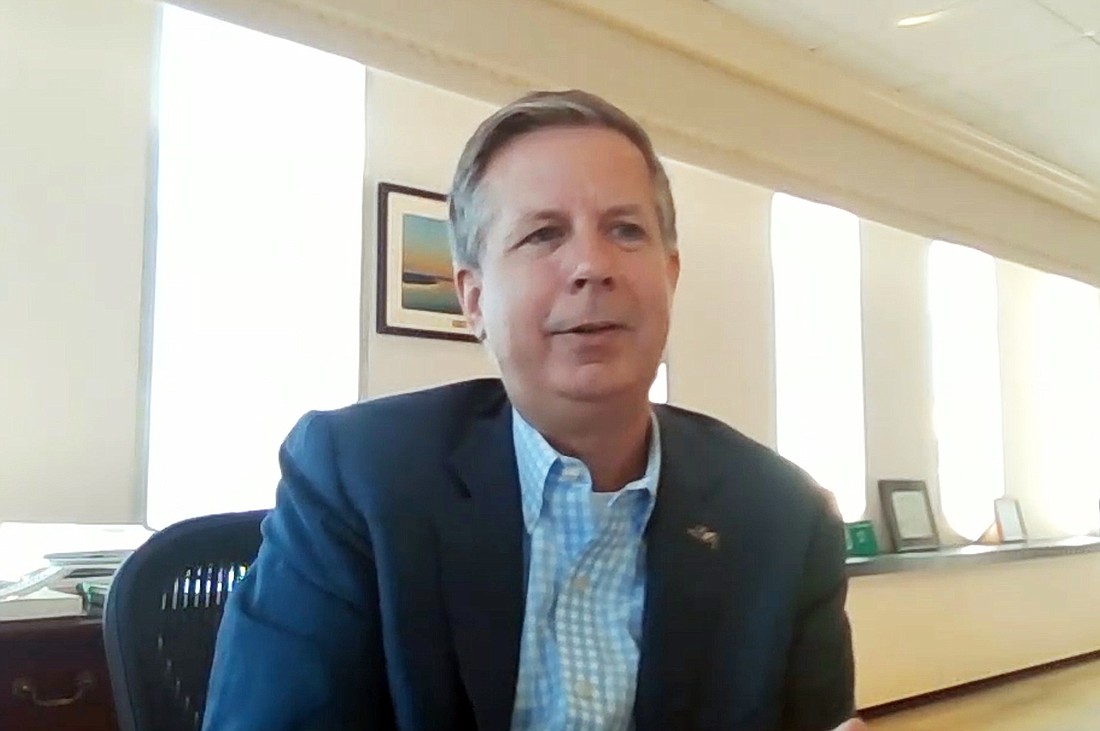
JEA CEO Jay Stowe said he didn’t walk into the city-owned utility’s Downtown West Church Street headquarters on his first day with preconceptions.
Stowe assumed the top executive role at JEA on Nov. 30, ending a 1 ½-year period that saw an attempt to sell JEA to a private company, CEO Aaron Zahn and his senior leadership team fired, a new board appointed, and City Council and U.S. Department of Justice investigations.
Stowe said the situation makes his internal priority a focus on JEA employees in his first three to six months as CEO.
“They’ve been through a lot as a staff,” Stowe said. “In spite of what they’ve gone through, they have kept doing fantastic work focused on the community. That becomes my first priority.”
Stowe said repairing damage to JEA’s culture will be a daily task of treating employees and customers with courtesy and respect.
“Well, this may sound a little odd. I don’t think we work on trust and I don’t think we work on culture. Those are outcomes of the way we do our business every day,” he said.
Stowe said it’s important to begin “getting interim off” the titles of the senior leadership team brought in by interim CEO Paul McElroy.
Stowe doesn’t plan to make “rash” decisions or immediate changes in JEA’s management. Instead, he wants to assess the utility’s executive organization before making McElroy’s appointments permanent or recruiting internally or externally.
He said JEA’s daily operations are not in a state of emergency and credits the interim executive team for that, allowing him time to assess.
“Some of the people that are in those roles could be in those roles longer term, but some of them may not be,” Stowe said. “I’ve had that specific conversation with them. It won’t be a surprise to them at all.”
Stowe said he’s had phone conversations with a few City Council members but hasn’t held in-depth discussions with local lawmakers and City Hall representatives.
He plans to meet early on with JEA’s top commercial customers and regional stakeholders, such as school districts and hospitals.
Water and rates
Stowe said capital improvements for JEA’s water system is one of the utility’s greatest needs in the coming decade.
He wants JEA to continue its exploration of conservation, reclaimed water and aquifer recharge with purified recycled water as alternative sources.
“It comes back to, just like the power supply, diversity in the way we treat the water and the way that we manage the wastewater,” Stowe said. “Diversity in all things is positive, and that’s another example of it.”
A Nov. 5 memo outlining JEA’s integrated water resource plan says production is approximately $65 million of the overall $500 million per year water-wastewater system revenue requirements.
The memo states that those alternative water sources could cost three to five times what JEA spends to produce from traditional groundwater sources, which Stowe acknowledges needs to be explored as population growth in Northeast Florida puts more pressure on the Floridan aquifer.
Stowe knows that adding those alternative sources will come with a price tag. He said JEA’s coming capital investment, a five-year $2.5 billion plan, and ongoing operating and management costs will put pressure on customer rates.
JEA’s five-year financial assumption report predicts the need for 1% revenue growth in fiscal years 2023-25 in the electric system and the same in FY 2025 for water.
Some of that money could come from a residential rate increase, but Stowe said a rate hike is not “the first lever we pull.”
“Rates and revenue are not the drivers. It’s serving the customers,” Stowe said.
“Part of our job is to balance the rate on all of our systems, with the costs that go along with that.”
Plant Vogtle, electric and CO2 emissions
Stowe’s attitude toward JEA’s purchase power agreement with the Municipal Electric Authority of Georgia in nuclear Plant Vogtle differs from Zahn and the previous board.
Like McElroy, he sees Plant Vogtle as a way to mitigate fuel costs and a key in JEA’s carbon footprint reduction plan.
“It’s going to help drive down the carbon emissions, it’s going to control fuel costs and I think ultimately it will be something positive for our customers. But it is not going to be a singular item that is driving all our decisions,” Stowe said.
Like with other areas of his job, the new CEO is fact-finding what the right fuel mix will be for JEA’s energy portfolio.
Stowe said he’s open to exploring nuclear and more renewables like solar and natural gas.
“We will make the best decision we can for our customers, but I don’t go into any of this with a preconceived answer or notion that we solely increase one or the other,” Stowe said.
“In the industry as a whole and across the county, there are more and more customers that are asking for more renewables and more distributed resources. We will respond to those types of activities, too, so we’re going to balance all those things.”